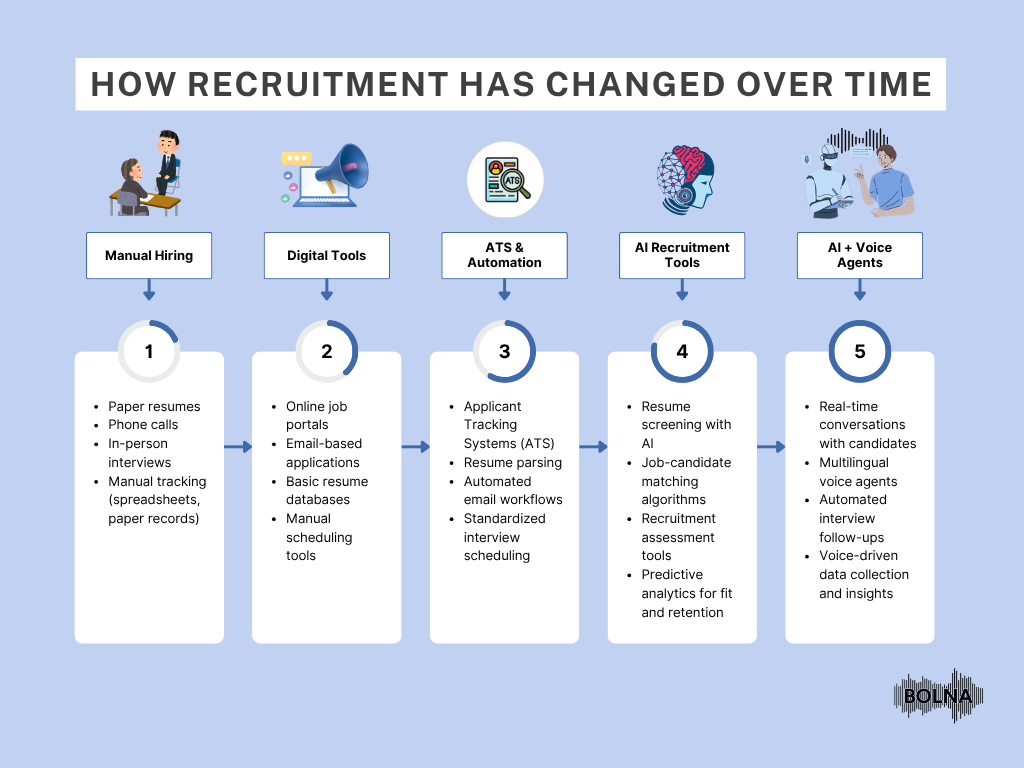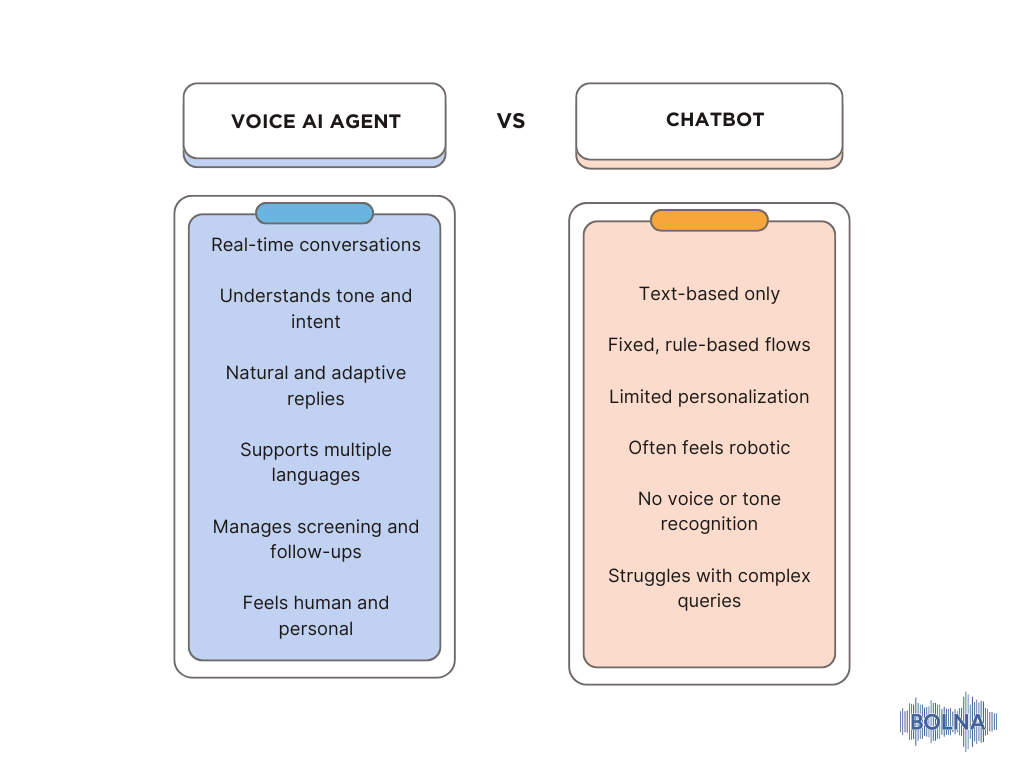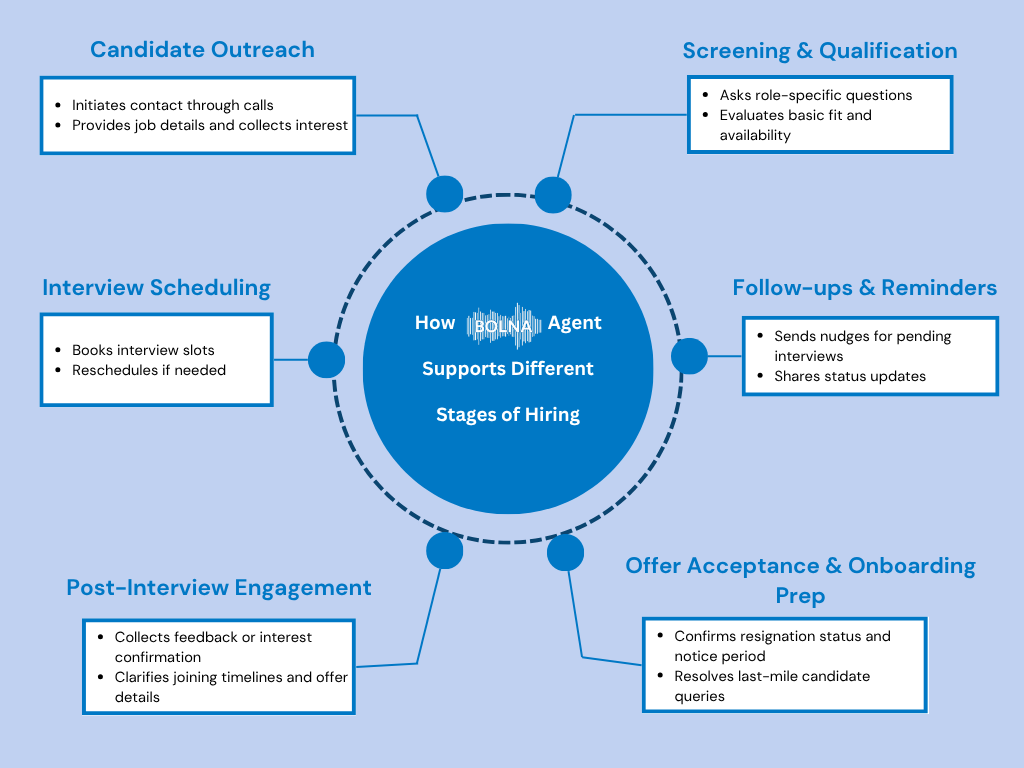Hiring has changed fast. In 2025, artificial intelligence will play a central role in how companies find and connect with talent. More teams now rely on AI recruiting tools to make hiring faster, more accurate, and more cost-effective. Recent reports show that AI-driven platforms reduce hiring costs by up to 30%. That kind of impact matters for businesses of all sizes.
These tools help teams manage large volumes of applications, improve screening accuracy, and save hours of manual work. One of the most interesting technologies in this space is the voice AI agent, built to engage with candidates in a way that feels real and human.
Unlike forms or chatbots, voice AI agents can hold natural conversations. They screen applicants, answer questions, schedule interviews, and operate in real time across multiple languages. This article will explore how AI recruiting tools are used in 2025 and why voice AI agents are becoming a core part of modern hiring strategies.
Table of Contents
How Recruiting Tools Are Used in 2025
Recruiting has come a long way. What began with paper resumes and phone calls has become faster and wiser with artificial intelligence. AI recruitment tools support nearly every hiring stage, from screening to scheduling and job matching.
Tasks that once took hours are now handled in minutes. 99% of organizations use AI in at least one part of their hiring process. It has become a standard, not a trend. With automation, teams reduce time-to-hire while staying focused on the candidates who matter. Many also use recruitment assessment tools to evaluate skills, communication style, and overall fit through structured tests and data-backed scoring.

A recent survey found that 98% of users reported better results in speed and screening accuracy after adopting AI-based hiring systems. Now, attention is shifting to tools that not only save time but also feel more human. Voice AI agents are emerging to bring real conversation back into early hiring. They help companies engage candidates naturally while keeping the process efficient and scalable.
What Makes Voice AI Agents Different
Many recruiting tools still rely on text. Chatbots, forms, and automated emails are common at the start of the hiring process. While they can move quickly, they often feel mechanical. For candidates, it can be hard to tell if anyone is listening.
A voice AI agent offers something more natural. It speaks and listens in real time. It responds to what the candidate says and how they say it. The conversation flows more like it would with a real recruiter, which helps people feel more at ease and more likely to share honest answers.

More hiring teams are using AI voice agent services for businesses to improve how they handle screening, availability checks, and early candidate conversations. These agents work around the clock, speak multiple languages, and manage high volumes of interviews without additional staff.
The difference goes beyond convenience. Voice AI agents capture tone, pacing, and intent. That gives recruiters better context from the first interaction. When candidates feel heard, they tend to stay in the process longer and provide more thoughtful responses. That leads to stronger decisions and a better experience on both sides.
Comparing Leading Providers of Voice AI for Recruiting in 2025
Voice AI is now an important part of modern recruiting. Each platform uses it differently to improve speed, scale, and candidate experience. Let us look at some of the leading providers in this space.
Bolna
Bolna helps hiring teams run conversations that feel more real and less scripted. Instead of relying on typed responses or static workflows, it uses a voice AI agent to speak with candidates in real time. The agent listens, responds, and adapts to how the conversation unfolds.
Each voice AI agent can be tailored to a specific step in the hiring process. One might handle early screening, another could manage interviews, and others could take care of feedback or offer details. Everything runs inside one platform, which helps teams stay organized and consistent.

Getting started takes just 5 minutes. Bolna offers a no-code dashboard that allows recruiters to build and launch agents quickly, without needing technical help. The platform includes API access and integration support for applicant tracking systems and external AI recruiting tools for more complex setups.
Bolna’s voice AI agent supports multiple hiring stages
Bolna supports both incoming and outgoing calls. It can handle hundreds of conversations at the same time while maintaining a clear, human-like voice quality. Agents speak several languages, adapt to different job types, and respond naturally to pauses and interruptions.
Pricing is flexible and based on usage. Bolna helps teams create honest conversations at scale, without adding extra steps to the process.
Mercor
Mercor helps companies connect with remote professionals. It focuses on speed and accessibility, using asynchronous interviews and resume screening to match candidates with open opportunities.
Candidates complete a short AI-led interview and upload their resume. Once reviewed, profiles are added to a growing talent pool. Employers can browse, shortlist, and reach out directly. Mercor highlights competitive hourly rates, typically between 90 and 140 dollars, and has supported over 5,000 openings in recent months.
The platform is built for fast hiring. Features like one-click scheduling, contract dispatch, and global payments make it useful for project-based or short-term roles.
Mercor does not support live voice interviews, customizable workflows, or deeper conversational tools. It works well for teams that need quick access to vetted talent but may not meet the needs of companies seeking real-time interaction or multi-stage engagement. For those cases, platforms with voice AI agents may offer a better long-term fit.
Micro1
Micro1 is designed to help teams screen technical candidates at scale. Its AI recruiter, Zara, guides applicants through pre-recorded interviews that focus on skills, experience, and problem-solving ability. Some sessions also include coding tasks or structured assessments, depending on the role.
Completed interviews are recorded and shared with hiring teams for review. This format allows recruiters to evaluate candidates without scheduling live calls. Micro1 supports high-volume hiring and reports processing over 10,000 interviews each month. It is often used for roles in software development, BPO, and customer support across multiple regions.
The platform does not support real-time interaction or voice-based conversations. It works best as a first-round filter for teams that need structured responses and clear data early in the process. For companies focused on efficiency, Micro1 reduces time spent on initial interviews. It also meets enterprise compliance standards, offering SOC 2 and ISO 27001 certifications to support secure, large-scale screening.
ConverzAI
ConverzAI is designed for recruiting tools, staffing agencies, and high-volume hiring teams that must move fast. It combines voice, SMS, email, and voicemail into one platform, making it easier to reach candidates across multiple channels.
The system conducts structured screenings that run between six and twenty-one minutes. After each session, it generates a real-time summary that feeds directly into applicant tracking systems such as Bullhorn, JobDiva, and Ceipal. Recruiters can scan key points without listening to complete recordings.
Most teams complete the setup in 5 days. ConverzAI supports thousands of conversations each week and uses predictive analytics to highlight strong candidates and recommend follow-ups.
It works best in structured environments where scale and consistency matter. While it does not offer deep control over agent behavior or flexible workflows, it performs well for teams that need reliable, repeatable outreach across a large talent pool.
Benefits of Using Voice Agents for Recruiting
Voice-first AI brings together speed, clarity, and a more human approach to hiring. Here are some of the core benefits companies are seeing today:
- Better candidate experience: People respond more openly when they feel like they’re having a real conversation. Voice agents help candidates feel heard instead of processed.
- Works across different stages: Voice AI can be used for screening, interviews, or follow-ups. Teams can design workflows that match their hiring goals without switching tools.
- Scales without losing depth: Voice agents manage thousands of conversations while still collecting detailed, thoughtful responses that support stronger decisions.
- Quick to set up and easy to use: No-code tools make it simple for HR teams to get started. Most voice AI platforms can be live within minutes, even without technical support.
- Connects with existing systems: Voice AI integrates with applicant tracking systems, CRMs, and calendars so every interaction moves the process forward.
Why More Teams Are Choosing Bolna
More teams are choosing Bolna as they look for AI recruiting tools that can do more than just automate tasks. Hyreo, a global hiring platform, used Bolna to improve post-offer engagement. Voice AI agents followed up with candidates, answered questions, and flagged early signs of drop-off. The result was 100% call coverage, 80% less recruiter effort, and a major improvement in candidate experience.
Awign, one of the largest part-time job platforms, turned to Bolna to manage technical hiring at scale. Bolna replaced manual interviews with AI-led conversations that adjusted to language, role, and schedule. Over 60% of interviews were completed in one round, and hiring costs dropped by 65%.
For both teams, Bolna helped reduce time-to-hire, improve consistency, and ease the burden on recruiters. It showed how voice-based AI recruiting tools can support high-volume hiring while keeping the process personal and efficient.
Conclusion
Recruiting tools have moved beyond basic automation. In 2025, the tools that lead are those that bring real conversation into hiring. Voice AI agents enable companies to go beyond forms and filters by creating natural, real-time interactions that improve how candidates engage from the very first step.
For teams focused on smarter, more scalable hiring, voice-driven AI offers more than efficiency. It blends structure with flexibility and brings depth to every conversation without adding complexity. As hiring continues to evolve, the most effective AI recruiting tools will be the ones that combine speed with genuine connection. They will set a new standard for how companies find, assess, and build relationships with talent.
Bolna is changing how teams hire by combining voice-based interviews with automated candidate engagement. Its Voice AI helps recruiters save time, lower costs, and run consistent, high-quality hiring at scale. You can explore a live demo and review the API documentation to see it in action.
FAQ
What are AI recruiting tools, and how are they used in 2025?
AI recruiting tools help companies automate key parts of the hiring process, including screening, matching, and scheduling. In 2025, they are widely adopted to save time, reduce costs, and improve decision-making across hiring teams.
How do Recruitment tools differ from traditional hiring platforms?
Recruitment tools use intelligent algorithms to evaluate candidates based on skills, experience, and fit. Unlike older platforms, they offer more tailored insights and reduce manual effort through smart automation.
How does Bolna compare to other AI recruiting tools?
Bolna stands out by using a voice AI agent to run real-time interviews and manage candidate conversations at scale. It supports everything from screening to post-offer follow-ups and integrates easily with existing systems, making it a strong choice for businesses seeking both speed and personal engagement.
What are recruitment assessment tools, and how do they help?
Recruitment assessment tools provide structured ways to evaluate candidate skills, communication, and fit. They support more consistent, unbiased decision-making by giving recruiters reliable data from the start.
What are AI voice agent services for businesses, and who should consider them?
AI voice agent services for businesses offer real-time, voice-driven interaction with candidates. They are ideal for companies handling high volumes of applicants and looking to improve communication without adding more recruiters.
When should companies use voice AI agents in hiring?
Voice AI agents are best used when hiring teams need to handle large volumes of candidates efficiently without losing the human element. They are ideal for early-stage screening, interview scheduling, post-offer follow-ups, and anytime real-time, conversational engagement can improve candidate experience and reduce manual workload.